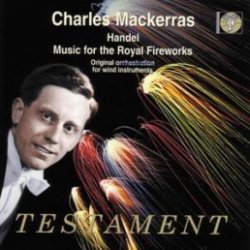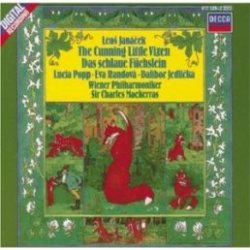Sir Charles Mackerras Memorial Concert, Royal Festival Hall | reviews, news & interviews
Sir Charles Mackerras Memorial Concert, Royal Festival Hall
Sir Charles Mackerras Memorial Concert, Royal Festival Hall
Happy, energetic tribute to the long-serving master conductor
In the last year of his life he was, as a colleague noted when we learned of Charles Mackerras’s death, the wise old gamekeeper in the spring forest of Janáček's Cunning Little Vixen. No wonder Mackerras, we were told last night by his conductor nephew Alexander Briger, wanted that most ecstatic celebration of the natural order for his memorial, just as Janáček had had it played at his funeral. Was it trivialised by an encore number from Mackerras’s deliciously arranged Sullivan potpourri-ballet, Pineapple Poll? Not a jot, mate.
He gave his final unforgettable concerts with the Philharmonia last December, but he'd pencilled in more years in advance. Last night was to have been his, too, which of course in a sense it remained, but it now became a splendid three-headed monster shared between the period-instrument group he loved so much, the Orchestra of the Age of Enlightenment, and his bigger band.
So much of his vibrant life was here, starting with presenter Anthony Andrews, who grew up next door to the Mackerrases. Janáček's recurring cycle found itself reflected in the meeting between our best-loved veteran baritone, Sir Thomas Allen, and a treble frog (Sebastian Cox) who gets the last youthful word, as well as a sharing of conducting duties between the new maestro embraced by Rattle in Berlin, Tomáš Netopil, nephew Briger as a worthy keeper of the flame and the likeable, communicative Stephen Devine directing the OAE from the harpsichord.
 It would have been fun to emulate Mackerras's wacky early recreation of the original wind-band forces for Handel's Royal Fireworks Music, 26 oboes - his chosen instrument - included (that shouldn't be missed on CD, pictured right). Instead we had stately, inscaped splendour from OAE strings and woodwind alongside three capricious authentic horns and four trumpets.
It would have been fun to emulate Mackerras's wacky early recreation of the original wind-band forces for Handel's Royal Fireworks Music, 26 oboes - his chosen instrument - included (that shouldn't be missed on CD, pictured right). Instead we had stately, inscaped splendour from OAE strings and woodwind alongside three capricious authentic horns and four trumpets.
Star trumpeter David Blackadder then stepped forward for collegial fun with soprano Mhairi Lawson - a last-minute replacement for Mackerras's beloved Rebecca Evans, who's also had to pull out of the ENO Don Giovanni - in "Let the bright seraphim". The exuberant ornamentation here reminded us of one of Charles's most cheerful obsessions. But there was also a chaste, simple "How beautiful are the feet" from Messiah. Lawson, if a little soft-grained, was throughout exactly the kind of musicianly, personable singer Mackerras adored.
Dvořák's Seventh Symphony was here because it was when discovered poring over the score in a South Kensington cafe that the young Mackerras was told he ought to apply for a grant to study in Czechoslovakia. He did, and of course became Czech music's greatest ambassador in the world at large. He would no doubt have approved the sweep and energy of young Netopil's urgent interpretation, and especially the dying falls of the first two movements, but I couldn't help thinking of the way Mackerras always made the minutest adjustments for breathing space even at his most direct and headlong. Those, along with sheer refinement of sound, we didn't often get here.
Netopil also seemed a little too keen at first to present Mozart's Sinfonia Concertante for violin and viola as St Vitus's Dance, but soon unwound, and the fizzing dialogues of Julian Rachlin and Lawrence Power clearly needed that edge. Their keen drama - astounding viola-player Power ever so marginally the freer in his handling of runs and responses - was tempered by supremely cultured inwardness in the Andante and sheer good humour for the charming finale.
 Wouldn't it have been Mozart which Mackerras wanted to take as his one score to heaven? Not so, Briger told us: over a glass of wine in a break from their joint work on ENO's The Makropulos Case, his uncle insisted that the final scene of Janáček's Cunning Little Vixen was his favourite piece of music. That's good to hear, since his recording (pictured left) has been my top desert island disc since I first heard it.
Wouldn't it have been Mozart which Mackerras wanted to take as his one score to heaven? Not so, Briger told us: over a glass of wine in a break from their joint work on ENO's The Makropulos Case, his uncle insisted that the final scene of Janáček's Cunning Little Vixen was his favourite piece of music. That's good to hear, since his recording (pictured left) has been my top desert island disc since I first heard it.
Briger served that great love glowingly. The suite which runs the opera's first two scenes with only two cuts was often precipitous and even hair-raising in Janáček's sudden changes of tempo and colour, but underlined the autumnal melancholy which dominates the first two scenes until the Vixen grows up - something that's so often obscured in the cute-animal parade of various productions. There was more extraordinary teamwork here, not least in the heartbreaking dying fall of front-desk violins Zsolt-Tihamér Visontay and Maya Iwabuchi with the Philharmonia's flautist of exquisite sensibility, Emer McDounough.
And I have to say that, while I didn't shed the expected tears at Mackerras's last, rather fraught performance of the Vixen at Covent Garden, they flowed freely last night. Allen basked in the orchestral glow of the final scene's natural rebirth and pulled out the stops for the sudden ecstatic surges. I think it was right to hear those euphoric words about the woods in English: "People will pass by in silence and bowing their heads, and all the joy of heaven will unfold, covering them in glory."
At that Mackerras, a pantheist according to his daughter Catherine in a treasurably illustrated souvenir programme, was no doubt giving us the open smile in evidence throughout his last performances. As for the dashing encore string of Sullivan tunes dressed up with glorious counterpoints and brilliant colours, we could have done with more than just the opening of Pineapple Poll. The complete ballet in concert is surely a must for next year's Proms. And can we have Mackerras's Prom Patience on CD or DVD soon, please?
Listen to Mackerras's vintage recording of the final number from Pineapple Poll:
Share this article
Add comment
more Classical music
 Bell, Perahia, ASMF Chamber Ensemble, Wigmore Hall review - joy in teamwork
A great pianist re-emerges in Schumann, but Beamish and Mendelssohn take the palm
Bell, Perahia, ASMF Chamber Ensemble, Wigmore Hall review - joy in teamwork
A great pianist re-emerges in Schumann, but Beamish and Mendelssohn take the palm
 First Persons: composers Colin Alexander and Héloïse Werner on fantasy in guided improvisation
On five new works allowing an element of freedom in the performance
First Persons: composers Colin Alexander and Héloïse Werner on fantasy in guided improvisation
On five new works allowing an element of freedom in the performance
 First Person: Leeds Lieder Festival director and pianist Joseph Middleton on a beloved organisation back from the brink
Arts Council funding restored after the blow of 2023, new paths are being forged
First Person: Leeds Lieder Festival director and pianist Joseph Middleton on a beloved organisation back from the brink
Arts Council funding restored after the blow of 2023, new paths are being forged
 Classical CDs: Nymphs, magots and buckgoats
Epic symphonies, popular music from 17th century London and an engrossing tribute to a great Spanish pianist
Classical CDs: Nymphs, magots and buckgoats
Epic symphonies, popular music from 17th century London and an engrossing tribute to a great Spanish pianist
 Sheku Kanneh-Mason, Philharmonia Chorus, RPO, Petrenko, RFH review - poetic cello, blazing chorus
Atmospheric Elgar and Weinberg, but Rachmaninov's 'The Bells' takes the palm
Sheku Kanneh-Mason, Philharmonia Chorus, RPO, Petrenko, RFH review - poetic cello, blazing chorus
Atmospheric Elgar and Weinberg, but Rachmaninov's 'The Bells' takes the palm
 Daphnis et Chloé, Tenebrae, LSO, Pappano, Barbican review - lighting up Ravel’s ‘choreographic symphony’
All details outstanding in the lavish canvas of a giant masterpiece
Daphnis et Chloé, Tenebrae, LSO, Pappano, Barbican review - lighting up Ravel’s ‘choreographic symphony’
All details outstanding in the lavish canvas of a giant masterpiece
 Goldscheider, Spence, Britten Sinfonia, Milton Court review - heroic evening songs and a jolly horn ramble
Direct, cheerful new concerto by Huw Watkins, but the programme didn’t quite cohere
Goldscheider, Spence, Britten Sinfonia, Milton Court review - heroic evening songs and a jolly horn ramble
Direct, cheerful new concerto by Huw Watkins, but the programme didn’t quite cohere
 Marwood, Power, Watkins, Hallé, Adès, Bridgewater Hall, Manchester review - sonic adventure and luxuriance
Premiere of a mesmeric piece from composer Oliver Leith
Marwood, Power, Watkins, Hallé, Adès, Bridgewater Hall, Manchester review - sonic adventure and luxuriance
Premiere of a mesmeric piece from composer Oliver Leith
 Elmore String Quartet, Kings Place review - impressive playing from an emerging group
A new work holds its own alongside acknowledged masterpieces
Elmore String Quartet, Kings Place review - impressive playing from an emerging group
A new work holds its own alongside acknowledged masterpieces
 Gilliver, LSO, Roth, Barbican review - the future is bright
Vivid engagement in fresh works by young British composers, and an orchestra on form
Gilliver, LSO, Roth, Barbican review - the future is bright
Vivid engagement in fresh works by young British composers, and an orchestra on form
 Josefowicz, LPO, Järvi, RFH review - friendly monsters
Mighty but accessible Bruckner from a peerless interpreter
Josefowicz, LPO, Järvi, RFH review - friendly monsters
Mighty but accessible Bruckner from a peerless interpreter
 Cargill, Kantos Chamber Choir, Manchester Camerata, Menezes, Stoller Hall, Manchester review - imagination and star quality
Choral-orchestral collaboration is set for great things
Cargill, Kantos Chamber Choir, Manchester Camerata, Menezes, Stoller Hall, Manchester review - imagination and star quality
Choral-orchestral collaboration is set for great things

Comments
...
...
...